Mark Capell's Blog, page 2
June 29, 2014
June 26, 2014
Radio Podcast Commercial for "Edyl - Island of Immortality"
Here's the radio podcast commercial for the new novel "EDYL - Island of Immortality" which is out in six days. Music is by the incredibly talented Ukrainian musician Rugaroo. Find out more about her music at: https://soundcloud.com/r-roo
Published on June 26, 2014 04:10
June 22, 2014
June 16, 2014
New Novel Out 2nd July
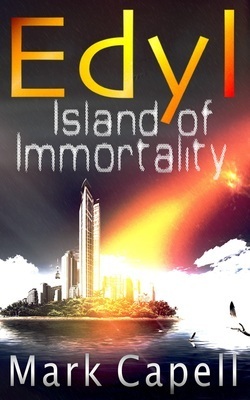 The new novel will be out on 2nd July. It's called "EDYL - Island of Immortality". If you want to be notified when it appears, sign up to the mailing list on the "contact" page. Or "like" the Facebook page.
The new novel will be out on 2nd July. It's called "EDYL - Island of Immortality". If you want to be notified when it appears, sign up to the mailing list on the "contact" page. Or "like" the Facebook page.It’s 2117 and the government has stopped reading your emails. It now reads your mind…
Every year, WOCO (the world government) nominates people to compete in the Edyl Olympiad. The prize? Immortality, and the right to live in the only place left in the world where the sun still shines — Edyl Island. But the competitors are being watched by a secret government division called The Reading Department to see if they’re worthy of that prize.
R77K is a thought reader on his first Edyl assignment. He has three targets: a rock singer, an athlete, and a mechanic. But one of them also moonlights as a contract killer. Why would a contract killer be nominated for immortality?
All is not well in paradise.
The deeper R77K delves into the minds of his targets, the closer he gets to them… and to the hidden agenda behind the nominations. Edyl is a festering world of lies, corruption and strife, but defying WOCO means fighting off attacks from other thought readers, means giving up any last chance of his own immortality.
Will he pay that price to save the nominees? And join the cause to put the world to rights?
EDYL - Island of Immortality is an intense mix of intrigue, romantic entanglements and drama in an epic science fiction tale.
“Even if you’re immortal, there has to be something worth dying for.”
EDYL - Island of Immortality will be available on 2nd July from Amazon and other online retailers.
Published on June 16, 2014 09:59
New Novel Out 2nd June
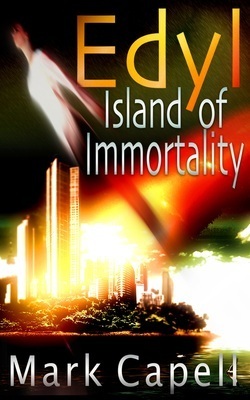 The new novel will be out on 2nd July. It's called "EDYL - Island of Immortality". If you want to be notified when it appears, sign up to the mailing list on the "contact" page. Or "like" the Facebook page.
The new novel will be out on 2nd July. It's called "EDYL - Island of Immortality". If you want to be notified when it appears, sign up to the mailing list on the "contact" page. Or "like" the Facebook page.It’s 2117 and the government has stopped reading your emails. It now reads your mind…
Every year, WOCO (the world government) nominates people to compete in the Edyl Olympiad. The prize? Immortality, and the right to live in the only place left in the world where the sun still shines — Edyl Island. But the competitors are being watched by a secret government division called The Reading Department to see if they’re worthy of that prize.
R77K is a thought reader on his first Edyl assignment. He has three targets: a rock singer, an athlete, and a mechanic. But one of them also moonlights as a contract killer. Why would a contract killer be nominated for immortality?
All is not well in paradise.
The deeper R77K delves into the minds of his targets, the closer he gets to them… and to the hidden agenda behind the nominations. Edyl is a festering world of lies, corruption and strife, but defying WOCO means fighting off attacks from other thought readers, means giving up any last chance of his own immortality.
Will he pay that price to save the nominees? And join the cause to put the world to rights?
EDYL - Island of Immortality is an intense mix of intrigue, romantic entanglements and drama in an epic science fiction tale.
“Even if you’re immortal, there has to be something worth dying for.”
EDYL - Island of Immortality will be available on 2nd July from Amazon and other online retailers.
Published on June 16, 2014 09:59
January 28, 2014
The Appeal of the Surreal
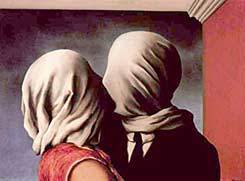 When you hear the word "surreal" these days it's usually as a synonym for the word "weird". Nevertheless, Surrealism's influence can be seen in so many of today's books, films and TV. And when the Surrealist movement began, it wasn't meant to be weird at all. They were just a group of very annoyed people.
When you hear the word "surreal" these days it's usually as a synonym for the word "weird". Nevertheless, Surrealism's influence can be seen in so many of today's books, films and TV. And when the Surrealist movement began, it wasn't meant to be weird at all. They were just a group of very annoyed people.Before I went to college, the Surrealists hadn't been a part of my world.
I left home to continue my education thinking I'd consumed quite a broad range of books, films and music. But in truth, I'd had quite a conservative upbringing in the cultural sphere. And I haven't yet forgiven my mother for force-feeding me Murder She Wrote on a Sunday night.
One of the subjects I studied at university was the History of Art. We travelled in time from the Dutch masters to the present day.
One lecture completely changed my views on art.
The previous week we'd finished with the impressionists. They were easy to digest. I was very comfortable with Monet, Manet, Renoir, Degas. I'd seen them everywhere: in galleries, on posters, as tablecloths, and on biscuit tins.
But this particular week we were to be introduced to the Surrealists. I knew nothing about them. They hadn't touched my early life in any shape or form.
Without ceremony, without introduction, the lecturer started the film projector. I knew nothing but the title of the film Un Chien Andalou, that was about to appear in front of my eyes, a collaboration between filmmaker Luis Buñuel and artist Salvador Dali.
I stared in utter amazement. It was crazy. None of it made sense. But I loved it. It shook me from my comfortable world. It woke me up.
Now if you've never seen Un Chien Andalou, a warning. It contains some quite startling images: a couple of dead, and rotting, donkeys being dragged along on the back of pianos by priests, ants emerging from the palm of a hand, somebody's eye being cut. The effects are quite crude because the film was made in 1929, but it can cause people to wince.
But aside from the occasional shocking image, what struck me was that there was no discernible story. Things happened, lots of things happened, but for no apparent reason. I thought I would become restless, annoyed at the lack of what I could perceive as meaning. But it was the opposite, I sat forward in my seat. I couldn't take my eyes off the screen. And it was because I was never sure what would happen next.
When I thought about it afterwards, I realised that having read and watched lots of detective stories, thrillers, classics, my mind had become stale. I had become a little immune to classic storytelling.
Most detective stories, for instance, begin with a crime. The detective walks around talking to people, then chases and catches the bad man who did it. The journey may be more or less interesting, but the destination is never in doubt. I'd never realised it before, but I preferred journey in which the destination is not so clear.
For the first time in a long time for me, here was something fresh. I swore to find out all about Surrealism.
Surrealism began in the early twentieth century, but really caught on when a group of artists called the Dadaists took up the creed after World War One. Their art threw off the shackles of rational thought and what they called "bourgeoise values" (which they blamed for the outbreak of the war). It also leaned heavily on Sigmund Freud's analysis of dreams. It was crazy, wild, uninhibited — all very appealing to the young college student.
I devoured Surreal art. Dali, Man Ray, Magritte, Duchamp and Max Ernst all fired my imagination.
Encountering Surrealism for the first time is very liberating. Everything you ever knew seems staid, even boring. Great works of art that once appeared elegant can appear cautious, dull. After discovering the Surrealists I felt like spitting on a Renoir canvas — the effect of light on water lilies, indeed. How quaint, I'd think, sarcastically.
But the problem with enthusiasm for the purest form of Surrealism is that it can soon burn out. You see, the trouble with an artistic movement in which anything goes, is that... anything goes. You can make a piece of art, write a book, or make a film and if people don't understand it, it's too easy to call it Surrealism. One of the techniques Surrealist writers used was automatic writing. It's essentially writing without the interference of the conscious mind. The results can also be interpreted as jumbled nonsense.
In fact, the Surrealist movement itself did soon burn itself out. By the 1950s it was less dominant. And yet it has never really died. It has been diluted, but that has often been its strength. It has spread to the mainstream and nowadays is often merged with a more straightforward narrative.
The most popular practitioner of Surrealism is probably the filmmaker David Lynch. Even in his most logical narratives you can feel the influence of those Dadaists.
When I came to write Café Insomniac, I knew the Surrealists would be an influence, they've been itching to pour out of my bloodstream for a while. But I also wanted the story to be a cohesive narrative.
The story is based on an insomniac. I've suffered from insomnia, on and off, for a good number of years. And when you get almost no sleep at all, life can become like a Surrealist painting. So I gave my hero, Justin, the worst case of insomnia ever recorded. This leads to some crazy psychological stuff happening to him. But I levelled it out with a murder mystery that happened at the same time. To see how a murder can be connected to insomnia, I'm afraid you'll have to read the book.
But my general point is that I think Surrealism will continue to have an influence on artists of all kinds. It's such an enticing idea that anything can happen and that the only limits are the limits of an imagination.
But these days, Surrealism can be at its most potent when mixed with other techniques. In that way, the surprises that Surrealism can produce can still reinvigorate a work of art, without attracting accusations of self-indulgence and gratuitousness.
Surrealism is definitely here to stay.
Published on January 28, 2014 09:13
January 26, 2014
Will Audiobooks Change Writing Styles?
Recently, Audible.com brokered a deal with the author David Hewson to publish his latest book, Flood, well ahead of its print run. As audiobooks rise in popularity, will the way they're written change?
As David pointed out, audio "is the original form of storytelling. It's what Homer did. Homer was not a writer, he was a storyteller".
I've always had a fondness for aural storytelling. I once met one of the few traditional storytellers still working the pubs in the UK, in the old folk tradition. He was such a vibrant performer, living the story he was telling, sometimes veering off into the melodramatic, but always finding a way to convey his enthusiasm. I asked him if he'd ever considered writing a book. He looked at me astonished. "Why would I want to do that?"
I listen to as many audiobooks as I read print or ebooks. Sometimes it's just more practical; while out for a walk, on a crowded train, or in a car.
But over the years, I've noticed something. Some writing styles are more suited to audio than others.
When I wrote the first story of Fogland , a series being released as a set of podcasts, I was writing specifically for audio.
I thought long and hard about it. At college, my first love was the theatre. I was obsessed by the rhythms of dialogue. I would read the plays of Harold Pinter obsessively, along with David Mamet and Tom Stoppard.
The "Pinteresque pause" has become a theatrical cliché. But these pauses are not empty silences, they are surrounded by dialogue that, even when the actor has finished speaking it, resounds like an echo within those pauses. In other words, the pauses are infused with meaning.
All writing should pay attention to the sound of words as well as their meaning, that's a given. In fact, one musical element — rhythm — can add meaning and atmosphere on its own. Short sentences, for instance, can imbue a sense of urgency. Thriller writers are well aware of this technique.
But in audio it's even more important. Some of the rhythm is down to the narrator. I was listening to one audiobook recently, one by a famous author. But the actor reading it, also suitably famous, sounded like he had a train to catch. The delivery was hurried, the sentences not differentiated one from another. This famous actor could have done with a few lessons from my storyteller in the pub.
In many ways, the audio presentation starts with the manuscript, begins with the source material. The author might be having more of an effect on the audio production than he realises.
The more audiobooks I listen to the more I become convinced that writing good audio stories is a different skill from writing good print ones. Even breaking important rules of grammar can become a necessity, not a stylistic choice.
At the moment, stories are written for print then recorded for audiobook, almost as an afterthought. I think this attitude might go back to their roots, originally being recorded mainly as a concession to the visually impaired. But there's no reason that a story written for one medium is suitable for another without adaptation.
Sometimes I've found myself drifting when listening to an audiobook, something I rarely do when reading. And it's not connected to what I'm doing while listening to it.
I think it is a matter of writing style. A sparse writing style seems to work better. Too much happening in a sentence can clog up the ears.
But that doesn't mean a writer is compelled to make the storytelling simplistic. To make up for the limitations of a sparse style, you have to make each word work twice as hard.
In writing for audio, it's not only what is being said but what is being left unsaid. The way to do this, as any dramatist will tell you, is with subtext. Like a good dramatist, you should make full use of subtext. Where you might be explicit about a situation in print, leaving room for a listener's imagination is important in audio.
I think this advice from Ernest Hemingway is particularly pertinent when it comes to writing for audio.
Of course, the best way to build up a respect for the sound of words is to listen to poetry. Good poetry marries sound and meaning — they are inseparable.
The Fogland Project is trying to present prose that works firstly as audio. I wonder if audiobooks, as they develop, will follow this trend, and whether authors will adapt their style if the primary audience switches to audiobooks?
For more information about The Fogland visit www.fogland.net . Episode one, CROW SQUARE can be listened to below...
As David pointed out, audio "is the original form of storytelling. It's what Homer did. Homer was not a writer, he was a storyteller".
I've always had a fondness for aural storytelling. I once met one of the few traditional storytellers still working the pubs in the UK, in the old folk tradition. He was such a vibrant performer, living the story he was telling, sometimes veering off into the melodramatic, but always finding a way to convey his enthusiasm. I asked him if he'd ever considered writing a book. He looked at me astonished. "Why would I want to do that?"
I listen to as many audiobooks as I read print or ebooks. Sometimes it's just more practical; while out for a walk, on a crowded train, or in a car.
But over the years, I've noticed something. Some writing styles are more suited to audio than others.
When I wrote the first story of Fogland , a series being released as a set of podcasts, I was writing specifically for audio.
I thought long and hard about it. At college, my first love was the theatre. I was obsessed by the rhythms of dialogue. I would read the plays of Harold Pinter obsessively, along with David Mamet and Tom Stoppard.
The "Pinteresque pause" has become a theatrical cliché. But these pauses are not empty silences, they are surrounded by dialogue that, even when the actor has finished speaking it, resounds like an echo within those pauses. In other words, the pauses are infused with meaning.
All writing should pay attention to the sound of words as well as their meaning, that's a given. In fact, one musical element — rhythm — can add meaning and atmosphere on its own. Short sentences, for instance, can imbue a sense of urgency. Thriller writers are well aware of this technique.
But in audio it's even more important. Some of the rhythm is down to the narrator. I was listening to one audiobook recently, one by a famous author. But the actor reading it, also suitably famous, sounded like he had a train to catch. The delivery was hurried, the sentences not differentiated one from another. This famous actor could have done with a few lessons from my storyteller in the pub.
In many ways, the audio presentation starts with the manuscript, begins with the source material. The author might be having more of an effect on the audio production than he realises.
The more audiobooks I listen to the more I become convinced that writing good audio stories is a different skill from writing good print ones. Even breaking important rules of grammar can become a necessity, not a stylistic choice.
At the moment, stories are written for print then recorded for audiobook, almost as an afterthought. I think this attitude might go back to their roots, originally being recorded mainly as a concession to the visually impaired. But there's no reason that a story written for one medium is suitable for another without adaptation.
Sometimes I've found myself drifting when listening to an audiobook, something I rarely do when reading. And it's not connected to what I'm doing while listening to it.
I think it is a matter of writing style. A sparse writing style seems to work better. Too much happening in a sentence can clog up the ears.
But that doesn't mean a writer is compelled to make the storytelling simplistic. To make up for the limitations of a sparse style, you have to make each word work twice as hard.
In writing for audio, it's not only what is being said but what is being left unsaid. The way to do this, as any dramatist will tell you, is with subtext. Like a good dramatist, you should make full use of subtext. Where you might be explicit about a situation in print, leaving room for a listener's imagination is important in audio.
I think this advice from Ernest Hemingway is particularly pertinent when it comes to writing for audio.
"If a writer of prose knows enough of what he is writing about he may omit things that he knows and the reader, if the writer is writing truly enough, will have a feeling of those things as strongly as though the writer had stated them. The dignity of movement of an ice-berg is due to only one-eighth of it being above water."Radio drama has often been called "the theatre of the mind". And this is true of audiobooks, too. Imagery works particularly well, especially if it's repeated with variations. Repetition is often frowned upon in print, but it's a vital tool in audio. Take a cue from music. You hear it in songs all the time, in the form of a chorus. The kind of resonance repetition brings with it, bounces around in a listener's head. I'm not recommending the equivalent of "she loves you yeah, yeah, yeah" repeated ad nauseum, but it does help in reinforcing tone and theme.
Of course, the best way to build up a respect for the sound of words is to listen to poetry. Good poetry marries sound and meaning — they are inseparable.
The Fogland Project is trying to present prose that works firstly as audio. I wonder if audiobooks, as they develop, will follow this trend, and whether authors will adapt their style if the primary audience switches to audiobooks?
For more information about The Fogland visit www.fogland.net . Episode one, CROW SQUARE can be listened to below...
Published on January 26, 2014 09:49
January 21, 2014
Fogland
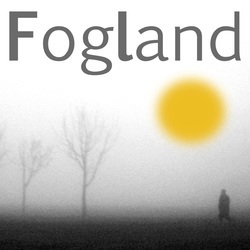 Today, a new concept in fiction is launched. It's called FOGLAND.
Today, a new concept in fiction is launched. It's called FOGLAND.Fogland is going to be a series of podcasts. Each new episode will feature a short story from a different writer.
But there's a connection.
Every story is set in the world of Fogland. This is a mythical town where, owing to its geographical location, fog descends on over two hundred days of the year.
Chosen writers can either expand on characters and story lines in previous episodes of Fogland or create brand new ones. The idea behind Fogland is to create a world that is ever-expanding. The title of each story will feature a Fogland street name.
The podcast is available from www.fogland.net and in the iTunes store for free. At the same time, authors will publish the text versions of their stories in online stores.
At the end of each podcast, listeners are encouraged to explore other works by the featured author by going to the Fogland website.
It's a way of introducing readers to writers, while, at the same time, producing an innovative fiction series.
The first story, Crow Square by Mark Capell, is live.
LINKS
Fogland website: www.fogland.net
Link to iTunes
Published on January 21, 2014 09:02
January 5, 2014
Casablanca and the Happy Ever After
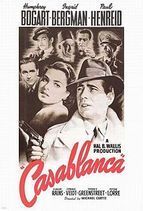 I once met somebody who always read the last page of a novel before she read the first page. She wanted to know that it turned out all right.
I once met somebody who always read the last page of a novel before she read the first page. She wanted to know that it turned out all right.We were having a drink at the time, and I tried my best not to let my jaw hit the table. I wondered if I'd heard her correctly.
"You read the last page before the first?" I asked.
"Yes," she confirmed.
"But doesn't that spoil the surprise?"
"I suppose so. But if I don't read that last page, I start worrying what's going to happen, whether the characters are going to be okay. I can't get through the book."
"But what if you don't like the ending?"
"I don't read the book."
I was dumbfounded. But then I started to ask others if they did this. And, to my surprise, she wasn't the only one.
I have to be honest, I don't get it. To me, a book (a traditional one at least) is a journey, a linear one. You start at point A and reach point B. Reading the ending first is like walking out of arrivals before you've sat in the departures lounge. In my universe, the ending doesn't even exist until I've read all the other pages.
When I further questioned the people who read back to front, it seemed that the desire to read the last page is often linked to the need for a happy ever after. That left me even more baffled.
You see, I've never needed a happy ending. Part of me subscribes to Dorothy Parker's view. The legendary acerbic wit was once asked to rewrite a screenplay and give it a happy ending. She replied in typically caustic fashion: “I know this will come as a shock to you, Mr. Goldwyn, but in all history, which has held billions and billions of human beings, not a single one ever had a happy ending.”
One of my favourite films, Casablanca, doesn't have a happy ending, but it's such a satisfying ending. In the final scene Rick decides that he and Ilsa can't be together, that she needs to stay with Lazlo to help him with his work that is important to the outcome of World War Two.
If Rick and Ilsa had walked off into the sunset together, would that have been a better ending? Is it just me or does it seem more romantic that they subverted their own needs for the needs of mankind?
Apparently, the studio wasn't allowed to show Rick going off with Ilsa anyway, because in those days you weren't allowed to end a film with a man absconding with a married woman. The Motion Picture Production Code, also popularly known as The Hays Code, forbade it.
In this age of post-modernist literature, the concept of an ending at all can seem quite antiquated. But in a genre such as romance, a happy ending is almost mandatory. I read one book blogger opining that she wouldn't even consider reading a book that didn't have a happy ending.
I think I'm suspicious of happy endings because of the fairy tales I read as a child. Most of those ended with "and they lived happily ever after". I quickly got the impression that these endings were divorced from everything that had gone before. "And they lived happily ever after" could be added to nearly every story.
Writing a happy ever after in grown-up books is even harder these days, that's for sure. We live in a more cynical age, and it requires great skill to execute one without it being too cheesy, overly sentimental, or too contrived.
Maybe the perfect ending is one with a foot in both camps — the bittersweet one. Let's ask Rick what he thinks:
"I'm no good at being noble, but it doesn't take much to see that the problems of three little people don't amount to a hill of beans in this crazy world. Someday you'll understand that."
Published on January 05, 2014 12:51
December 23, 2013
The Fussy Librarian features Cafe Insomniac
My book is being featured Tuesday at The Fussy Librarian, a new website that offers personalized ebook recommendations. Check it out! www.TheFussyLibrarian.com
Published on December 23, 2013 01:34





